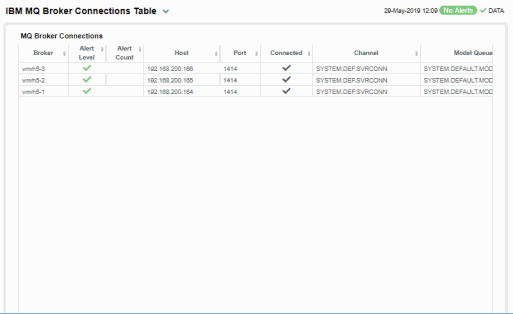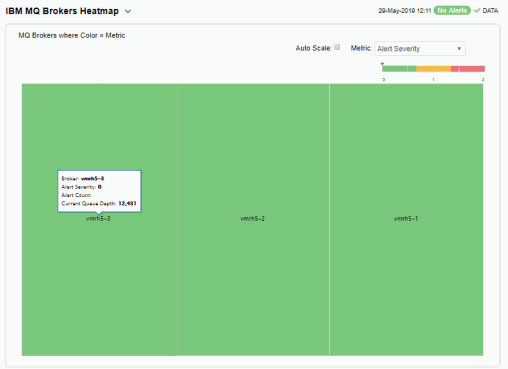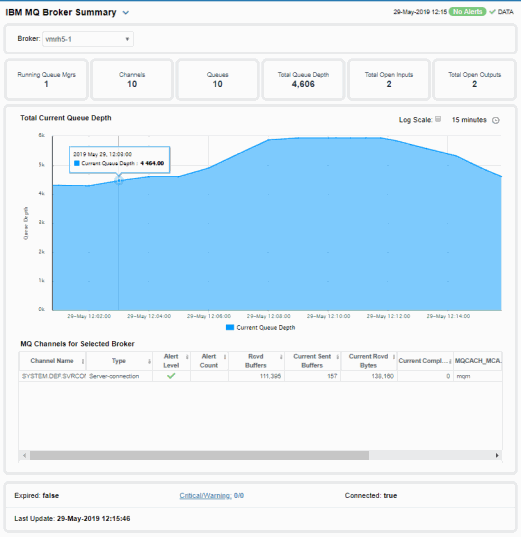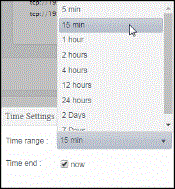IBM MQ Brokers View
See performance and utilization metrics for all of your IBM MQ Brokers.
Displays in this View are:
| • | IBM MQ Broker Connections Table: View a sortable list of utilization metrics for all IBM MQ brokers and compare broker metrics. |
| • | IBM MQ Brokers Heatmap: This display presents heatmap view of IBM MQ brokers and their alert states. |
| • | IBM MQ Broker Summary: This display presents performance metrics for a single IBM MQ Broker, as well as detailed metrics for its channels and queues. |
IBM MQ Broker Connections Table
Get connection information for all brokers such as Host IP address and Port number and Channel Model Queue Name, and investigate utilization metrics for all brokers such as Alert Level, Alert Count, Max Retries and Wait Interval.
Each row in the table contains data for a particular broker. You can search, filter, sort and choose columns to include by clicking a column header icon (to the right of each column label) and selecting Filter, Sort Ascending, Sort Descending or Columns.
Or just click any column header to sort and compare the values that interest you. Right-click on a table cell to Export to Excel or Copy Cell Value.
Investigate a broker, its channels and queues by double-clicking a row which opens the IBM MQ Broker Summary display.

|
MQ Broker Connections Table Each table row is a different connection. Column values describe the connection except where noted. |
||
|
|
Broker |
The name of the broker. |
|
|
Alert Level |
The current alert severity:
|
|
|
Alert Count |
The total number of alerts. |
|
|
Host |
The name of the host. |
|
|
Port |
The port number used. |
|
|
Connected |
When checked, denotes that the broker is connected. |
|
|
Channel |
The name of the channel. |
|
|
Model Queue Name |
Named model queue of the connection. |
|
|
Max Retries |
Maximum number of subsequent connection retry attempts. |
|
|
Retry Interval |
Minimum interval (in seconds) between connection retry attempts. |
|
|
Wait Interval |
Wait interval (in seconds) between attempts to create a connection. |
|
|
time_stamp |
The data and time of the last data update. |
IBM MQ Brokers Heatmap
View current alert status and performance metrics of all IBM MQ brokers. Use the Metric drop-down menu to view Alert Severity, Alert Count and Current Queue Depth.
Each rectangle in the heatmap represents a different broker, where the rectangle color indicates the most critical alert state for items associated with that broker. The rectangle size is the same for each broker.
By default, the Alert Severity metric is shown. Values range from 0 - 2, as indicated in the color gradient  bar:
bar:
 (2) Red indicates that one or more metrics exceeded their ALARM LEVEL threshold.
(2) Red indicates that one or more metrics exceeded their ALARM LEVEL threshold.
 (1) Yellow indicates that one or more metrics exceeded their WARNING LEVEL threshold.
(1) Yellow indicates that one or more metrics exceeded their WARNING LEVEL threshold.
 (0) Green indicates that no metrics have exceeded their alert thresholds.
(0) Green indicates that no metrics have exceeded their alert thresholds.
Answer questions such as, Are any queues reaching a state of critical health? Is the load evenly distributed across brokers and queues?
Investigate a broker, its channels and queues by clicking a rectangle which opens the IBM MQ Broker Summary display.
Mouse-over rectangles to view more details about host performance and status. Toggle between the commonly accessed Table and Heatmap displays by clicking the drop down list on the display title.
You can view data based on a log scale, which enables visualization on a logarithmic scale and should be used when the range in your data is very broad.

|
Fields and Data |
||||
|
|
Auto Scale |
Select to enable auto-scaling. When auto-scaling is activated, the color gradient bar's maximum range displays the highest value. Note: Some metrics auto-scale automatically, even when Auto Scale is not selected. |
||
|
|
Metric |
Choose a metric to view in the display. For details about the data, refer to vendor documentation. |
||
|
|
|
Alert Severity |
The current alert severity for items associated with the rectangle. Values range from 0 - 2, as indicated in the color gradient
|
|
|
|
|
Alert Count |
The total number of critical and warning unacknowledged alerts for items associated with the rectangle. The color gradient |
|
|
|
|
Current Queue Depth |
The current queue depth. The color gradient |
|
IBM MQ Broker Summary
Investigate the performance and health of a particular IBM MQ broker, its channels and itsqueues. Track utilization and performance metrics of channels and queues for a particular IBM MQ broker in a trend graph.
Choose a broker from the drop-down menu. Clicking on the information boxes at the top of the display (such as Running Queue Mgrs, Total Queue Depth and Total Open Inputs/Outputs) takes you to the IBM MQ Broker Connections Table display, where you can sort and compare the performance values of all brokers.
The trend graph traces the Current Queue Depth for the selected broker. You can specify the time range for the trend graph and view data based on a log scale, which enables visualization on a logarithmic scale and should be used when the range in your data is very broad.
The MQ Channels for Selected Broker table (the lower portion of the display) contains a row of data for each channel on the broker. Double-click a row to investigate the channel in the IBM MQ Channel Summary display. You can search, filter, sort and choose columns to include by clicking a column header icon (to the right of each column label) and selecting Filter, Sort Ascending, Sort Descending or Columns.
Or just click any column header to sort and compare the values that interest you. Right-click on a table cell to Export to Excel or Copy Cell Value.
Clicking the Critical/Warning link at the bottom of the display opens the Alerts Table by Component display. You can hover over the trend graph to see the values at a particular time.

|
Filter By: |
|
|
|
|
MQ Broker |
Select the broker for which you want to view data. |
|
Fields and Data |
||
|
|
Running Queue Mgrs |
The number of queue managers running on the broker. |
|
|
Channels |
The current number of channels on the broker. |
|
|
Queues |
The current number of queues on the broker. |
|
|
Total Queue Depth |
The total queue depth across all queues on the broker. |
|
|
Total Open Inputs |
The total number of open inputs across all queues on the broker. |
|
|
Total Open Outputs |
The total number of open outputs across all queues on the broker. |
|
Total Current Queue Depth Trend Graph |
Current Queue Depth -- Traces the total current queue depth for the selected broker. |
|
|
|
Log Scale |
Select to enable a logarithmic scale. Use Log Scale to see usage correlations for data with a wide range of values. For example, if a minority of your data is on a scale of tens, and a majority of your data is on a scale of thousands, the minority of your data is typically not visible in non-log scale graphs. Log Scale makes data on both scales visible by applying logarithmic values rather than actual values to the data. |
|
|
Time Settings |
Select a time range from the drop down menu varying from 5 Minutes to Last 7 Days. By default, the time range end point is the current time.
To change the time range, deselect the now toggle, which displays some additional date fields. You can click the left and right arrow buttons to decrease the end time by one time period (the time selected in the Time range drop down) per click, or you can choose the date and time from the associated calendar and clock icons. You can also enter the date and time in the text field using the following format: MMM dd, YYYY HH:MM:ss. For example, Aug 21, 2018 12:24 PM. Click the now toggle to reset the time range end point to the current time.
|
|
MQ Channels for Selected Broker Table |
||
|
|
Channel Name |
The name of the channel. |
|
|
Type |
The type of channel. |
|
|
Alert Level |
The current alert severity:
|
|
|
Alert Count |
The total number of alerts. |
|
|
Rcvd Buffers |
The number of buffers received. |
|
|
Current Sent Buffers |
The number of buffers received since the last data update. |
|
|
Current Rcvd Bytes |
The number of bytes received since the last data update. |
|
|
Current Completed |
The number of batches completed since the last data update. |
|
|
MQCACH_MCA_USER_ID |
The user ID used by the MCA. |
|
|
MQCACH_RCV_EXIT_NAME |
The receive exit name. |
|
|
MQCACH_RCV_EXIT_USER_DATA |
The receive exit user data. |
|
|
MQCACH_SEC_EXIT_NAME |
The security exit name. |
|
Expired |
When checked, performance data has not been received in the time specified in the Duration region on the RTView Configuration Application > Solution Package Configuration > IBM MQ > DATA STORAGE tab. |
|
|
Critical/Warning |
The total number of critical and warning alerts. |
|
|
Connected |
When true, denotes that the broker is connected. |
|
|
Last Update |
The date and time of the last data update. |
|








 bar, populated by the current heatmap, shows the value/color mapping. The numerical values in the gradient bar range from 0 to the defined Alert Level for the
bar, populated by the current heatmap, shows the value/color mapping. The numerical values in the gradient bar range from 0 to the defined Alert Level for the 


